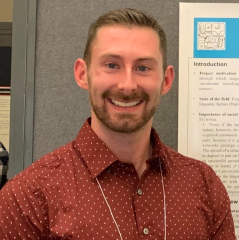Earlier this semester, three School of International Letters and Cultures faculty members at Arizona State University were selected as winners of the school’s course redesign grant competition. They were each provided with funding to update the curriculum of an existing course to give it a new focus.
Spanish Instructor Sean McKinnon, one of the three recipients, is currently teaching the revised version of SPA 194: Language in the U.S. The course examines why only about 20% of the United States population is bilingual despite it being a nation of immigrants and Indigenous peoples. McKinnon said he plans to revise the course again over the summer based on student feedback before teaching it again in fall 2022.
“I am enjoying teaching this general education course because I get to teach students to think critically about language and how it’s used in society,” he said.
McKinnon's proposal was to reframe the course around social justice and equity issues through critical perspectives. He used the pedagogical framework of critical language awareness to teach students about how language is embedded in social meaning and power dynamics. Some of their assignments include examining social media posts for their messages about language ideology. Students get to create a meme or TikTok video demonstrating what they have learned; McKinnon said this helps teach students that linguistic messages are present in their everyday lives.
“I think it is important for educators to think critically about what they’re teaching, how they’re teaching it and why, especially since ASU is known for being a center of innovation,” McKinnon said. “I’ve found that revamping my courses around social justice/equity issues has increased student engagement and enrollment, which hasn’t surprised me, since Gen ZGeneration Z (or Gen Z for short), colloquially also known as zoomers, is the demographic cohort succeeding Millennials and preceding Generation Alpha. Researchers and popular media use the mid-to-late 1990s as starting birth years and the early 2010s as ending birth years. Most members of Generation Z are children of Generation X. is so in tune with social justice and equity issues.”
Sara Lee
German Lecturer Sara Lee had a similar social justice-minded approach to updating her class, GER 494: Language and Disability. The course already engaged deeply with social justice and equity topics, so the redesign enabled Lee to add more opportunities for students to participate in community outreach, learn about career and internship options in the field, and complete projects applying their knowledge to real-life situations.
For example, students will develop material for after-school language classes that focus on the needs of learners with disabilities. Barrett, The Honors College students will be encouraged to complete an honors enrichment contract diving deeper into the course material, or even consider focusing their honors thesis on disabilities, inclusion and equity in different cultures.
Spanish Lecturer Dulce Estévez was one of five members of the award committee tasked with selecting which faculty members’ proposals should receive the funding to support their curriculum redesign projects.
"We were especially interested in courses that aimed at connecting students to their local community and challenged them to complete projects that enhanced their portfolios for their professional careers or future academic pursuits,” Estévez said. “Updating course content and adjusting course objectives to align with evolving students' interests and the job market requirements is essential.”
Enrico Minardi
Senior Lecturer in Italian Enrico Minardi was the final recipient of the course redesign grants. His class, ITA 319: Italian for the Professions, will be taught in fall 2022 with newly added career-specific material and assignments. Minardi said that while many of the assignments and readings of the previous version of the course have been kept, “this class represents a profound revisitation and reworking of Italian for the Professions as it used to be.”
Reflecting a broader trend across the school, the revamped course will focus on sustainability and how this concept affects the economy and Italian job market.
“It is the most popular economic sector among youth nowadays,” Minardi explained. “Italy is one of the leading countries in the sector, having started working on environmental protection legislation by the end of the 70s and 80s as the early implementation of recycling and the victory at the referendum to abolish nuclear energy in 1987 show.”
Students will receive training in the differences between Italian and U.S. business etiquette, the most important trends of the Italian economy, how to build a resume and apply for jobs, how to be successful in a job interview and how to apply for a work visa.
Their semester-long project will be an analysis – from the standpoint of sustainability – of socioeconomic organizations in Italy. They will prepare a multimedia exhibit documenting their findings that will be open to the public on campus and could be presented to other students or community members.
Sean McKinnon
For each of these three updated classes, students will be learning not just their course subject matter, but also how to apply it in the personal and professional worlds they hope to inhabit after graduation. McKinnon said he wants students to take what they learn and use it beyond the classroom.
“For my bilingual students, I hope that the class teaches them how to linguistically advocate for themselves and for their community, as well providing them with ideas and strategies for how to pass down their language to the next generation, if they decide to have children,” he said.
“And for my monolingual English students, I hope that they become better linguistic allies for bilinguals in the U.S. and also consider becoming bilingual themselves. … Knowing two languages promotes better cognitive flexibility, delays the onset of dementia and Alzheimer’s disease, and exposes you to new cultures and ways of being/thinking.”
This is in line with the principles that Estévez and the other members of the award committee were guided by as they reviewed applications for the funding. The school's mission is to prepare ASU students to become global citizens, which extends beyond linguistic proficiency to also include cultural awareness and lifelong curiosity about the world around them.
“At (the school), we aim to make the world more equitable and just by equipping students with a worldview that values the contributions and knowledge of diverse people groups to the field of study and profession students choose to pursue,” she said.
More Environment and sustainability

From ASU to the Amazon: Student bridges communities with solar canoe project
While Elizabeth Swanson Andi’s peers were lining up to collect their diplomas at the fall 2018 graduation ceremony at Arizona…

From environmental storytelling to hydroponics, student cohort crafts solutions for a better future
A select group of students from Arizona State University's College of Global Futures, a unit within the Julie Ann…

2 ASU faculty elected as AAAS Fellows
Two outstanding Arizona State University faculty spanning the physical sciences, psychological sciences and science policy have…





